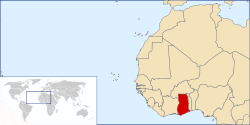Highlife & Ghanaian nationalism
Highlife Music & the complex relation between Western music, nationalism, and identity in Ghana following WWII.
Ghanaian popular music is involved in many ironies, in which American and Cuban culture (including Pan-Africanism and African American popular culture) -- inheriting from diverse African traditions -- plays a formative role in the constitution of Ghanaian nationalism, in its attempt to unify diverse ethnicities...themselves gathered in a post-colonial situation (i.e. Ghana = ex British Gold Coast & British Togoland). Tracing these ironies helps illuminate the complexity of the Ghanaian post-colonial situation.
The big picture: Political structures resulting from reassembly of shards of colonial period are cemented by mass-media popular music (e.g. Highlife) and political ideas (e.g. Pan-Africanism) which are themselves significantly influenced by cultural-political currents coming directly from the imperial/colonial powers, even if these currents can also be traced back to Africa. Such a picture is very complex indeed! Both social structures and symbolic forms are never free of the trace of the colonial process, even when the latter are used to achieve political independence for the former. Furthermore, it is always impossible to clearly demarcate "oppressor" and "oppressed" structures and forms.
All this points to the semantic malleability of symbolic forms.
In 1957, Ghana was formed out of the combination of four territories: Northern Territories, Ashanti, British Togoland, and the Gold Coast Colony, all British-ruled. Highlife was already the national popular music par excellence...
Musical forms of political and social expression
Professor John Collins:
“Artists and groups that have indigenized and de-acculturated popular performance should be considered as cultural heroes who have helped create a modern national identity…all have artistically contributed to the de-colonisation process”
(with thanks to Eilis Pourbaix & John Collins for their research)
